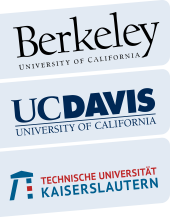

RESEARCH PROGRAM
Title: Prediction of transport properties of fluids from molecular simulation computer experiments
Name: Florian Fleckstein
E-Mail: Florian.Fleckenstein@mv.uni-kl.de
Phone: 0631 – 205 - 5587
Project description:
Starting situation
Transport properties of fluids, namely the shear viscosity and thermal conductivity, play an important role in manufacturing processes, e.g. cutting and grinding. In such processes, extreme conditions regarding temperature and pressure prevail in the contact zone. Experimental investigations of thermophysical properties at such conditions are presently not feasible. The prediction of transport properties by molecular simulation computer experiments based on classical force fields is an attractive alternative. However, relatively complex algorithms and computer programs are required for such transport property simulations. Also, different simulation techniques (equilibrium (EMD) as well as non-equilibrium (NEMD) methods) are available today. As in laboratory experiments, the reproducibility of computer experiments is in general affected by systematical errors which may for example stem from differences in the algorithms and implementations employed by different researchers. Today, practically no information is available on the computational reproducibility of molecular simulation computer experiments for the prediction of transport properties.
Approach
In this work, the reproducibility of transport property predictions by molecular simulation is investigated. In a first step, simple model fluids are considered. In a second step, complex real substances are considered. The influence of different factors on the reproducibility is systematically studied, e.g. the compilers, the hardware, the algorithms, and the implementations. Based on these results, new methods will be developed to improve the reproducibility of computer experiment predictions.
Expected Results
Better knowledge of transport properties under conditions as they are encountered in manufacturing processes is important, for example, for modeling nanoscopic processes under these conditions. This work will contribute to a better understanding of the influence of systematical errors in computer experiments. Based on these results, new approaches for reducing systematical errors in molecular simulation computer experiments can be developed. The results have also implications for other simulation techniques that are based on complex algorithms and numerics, e.g. computational fluid dynamic simulations.

